Having had a week to think about my initial concept and browsing for more and alternative ideas, theDark World is slowly starting to take on a more defined shape.
Dark Ages Northeast Europe and Bronze Age City States
The more I have been thinking about it, the more the idea has been growing on me to make the landscape and culture of early and pre-medieval Northeast Europe the primary stylistic reference for the setting. It really isn’t the sexiest part of the world for tales of great adventure. Or for pretty much any purpose. Summers and mild and wet, and winters too. There are some places that are quite pretty during a good summer or winter, but the landscape doesn’t really have majestic wonders of nature like you can find in Asia and America. On the North Sea and Atlantic you have at least proper storms that have an invigorating energy to them, while the Batic Sea is the very definition of “meh”.
But as a native, I guess you just can’t help but have a certain affection for it.
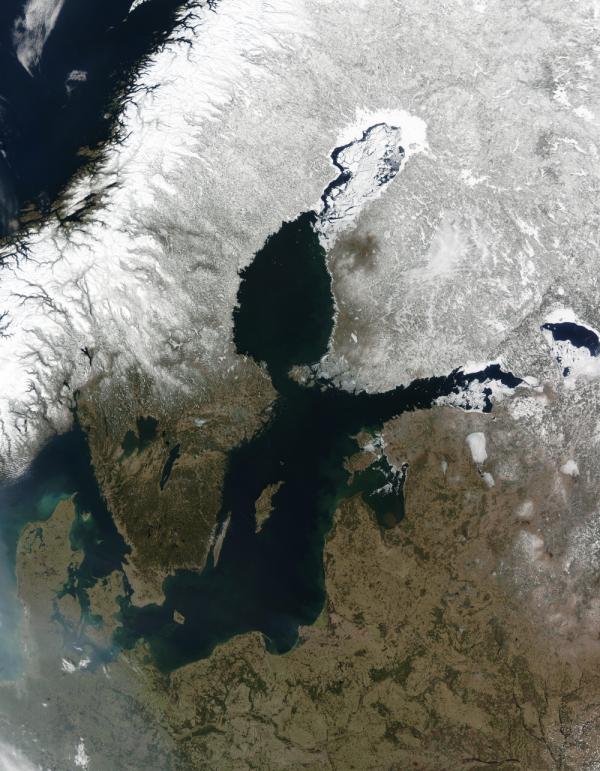 And if there is one thing that a cold, wet, dark, and quiet is actually really suited for, then it is dark fiction of things living in the misty forests and swamps. It’s our thing! This is the one niche where we can shine in contributing something to the greater world of fantasy. Except that dull grey and murky brown don’t shine. Ghostly lights, swamp witches, and fair maidens dragging travelers into black pools are what we have to offer.
And if there is one thing that a cold, wet, dark, and quiet is actually really suited for, then it is dark fiction of things living in the misty forests and swamps. It’s our thing! This is the one niche where we can shine in contributing something to the greater world of fantasy. Except that dull grey and murky brown don’t shine. Ghostly lights, swamp witches, and fair maidens dragging travelers into black pools are what we have to offer.
But simply following in the footsteps of The Witcher, Symbaroum, The One Ring, and Skyrim wouldn’t satisfy my creative drive and there isn’t really much point in rehashing something that has already been done very well by others. So I want to combine this influence with my interest in Bronze Age city states and priest kings. It’s easy to see that mediterranean empires don’t really feel like a fitting addition, but I think by reducing it to the kings and their palaces within confined cities could actually make it work. Some of these kings may claim to speak for a god or be chosen by a god, or even claim to be a god. And in some cases a city might prosper under the guidance of a powerful spirit.
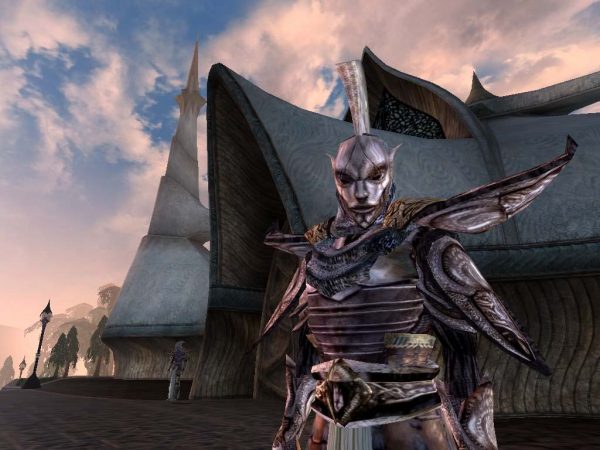 The soggy cold and rot of the wild swamps and forests should be complemented quite well by cities that have an atmosphere of lethargic decadence. The aristocracy indulges in opulence and extravagance, but it’s not ennergetic and flashy, rather leaning towards the delirious and often gloomy. They crave majestic splendor, but it really is more of a distraction than an expression of exuberance. There is a lot of bronze and gold, but it often has an air of tomb treasures to it. A display of wealth, rather than an expression of prosperity. It seems more than fitting to make wine and opium the two main exports from southern lands.
The soggy cold and rot of the wild swamps and forests should be complemented quite well by cities that have an atmosphere of lethargic decadence. The aristocracy indulges in opulence and extravagance, but it’s not ennergetic and flashy, rather leaning towards the delirious and often gloomy. They crave majestic splendor, but it really is more of a distraction than an expression of exuberance. There is a lot of bronze and gold, but it often has an air of tomb treasures to it. A display of wealth, rather than an expression of prosperity. It seems more than fitting to make wine and opium the two main exports from southern lands.
Out of Place, out of Time
I am actually of the opinion that the most fantastic feeling fantasy worlds are the ones that don’t have a propper history and geography. Tolkien did it, so lots of people did it too, and Howard’s Hybrian Age was basically filling in the unknown period just before the beginning of recorded history. On the other hand you have worlds like the Young Kingdoms of Elric, the world of Kane, and the particularly hazy universe of Dark Souls. There are things existing in the present that seem clearly ancient, but there is no sense of past events that go back more than a few years. It brings a dreamlike quality with it that I really enjoy. You don’t know how you got here and where here really is, but you just go along with it and don’t question it too much.
As far as people in the Dark World are concerned, things aren’t really changing over time. The oldest people around tell tales of how their grandparents had already lived in the same towns and in the same way as they do and there aren’t really any accounts of how it had been before. History and mythology are both completely unordered fragments of isolated events. They don’t form any kind of coherent narrative and there is little in the way of hints in what particular order they happened, how much time passed between them, and even where they took place.
Maps are just as bad. There are pretty clear and reliable maps that show the routes between the major cities and the more prominent towns, but towards the edges of the map details become much more sparse and complete conjecture before fading out into blank space. Merchant sailors know how to reach some of the major ports in the south through which the cities trade with distant lands, but even they don’t have any real understanding where the exotic goods they bring north originally came from. Southern merchants take pelts, cod, and salt and give wine, opium, and spices in return. That’s as much as the captains need to, and care to know.
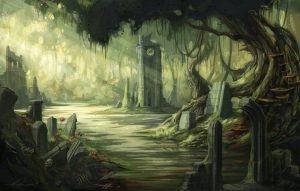 However, there is undeniable evidence that the world does change, at least over long stretches of time. While nobody remembers a time before the cities and their ruling dynasties or immortal god-kings, ruins of past civilizations can be found in many places. It is actually quite common to find burried (or even only partly burried) ruins below the streets and palaces of most cities. Where these ruins come from is of course as much a mystery as everything else to do with the past. But they often contain ancient treasures that are of particular value to magicians. Occult knowledge may become lost, but magic doesn’t change and these ancient rediscoveries are more valuable to them than silver and gold. Or lives.
However, there is undeniable evidence that the world does change, at least over long stretches of time. While nobody remembers a time before the cities and their ruling dynasties or immortal god-kings, ruins of past civilizations can be found in many places. It is actually quite common to find burried (or even only partly burried) ruins below the streets and palaces of most cities. Where these ruins come from is of course as much a mystery as everything else to do with the past. But they often contain ancient treasures that are of particular value to magicians. Occult knowledge may become lost, but magic doesn’t change and these ancient rediscoveries are more valuable to them than silver and gold. Or lives.
The lack of a sense of the past also brings with it a lack of sense of the future. People usually don’t care to plan ahead for the future and certainly not any further than their own lifetime. Things appear to be the same as they have for as long as anyone can remember and they probably will remain for much longer than anyone can imagine. As said in the RPG Sorcerer & Sword, “No one has a single thought on about being socially constructive in a large sense”. If you want to have any kind of change, you can only change things here, and change them now. You can destroy a gang of bandits or dispose of an unpopular despot, but you can’t end banditry or despotism. You can change your position in the game, but you can not change the game.
The Otherworld and the Supernatural
The true extend of the world extends well beyond what ordinary mortals can perceive. A fish thinks that the river is the entire world, but there are many more places that it can never reach by itself, and that will almost certainly be its death. Every place that exists in the mortal world also exists in the otherworld, but it is much bigger than that. There are many more places in the otherworld in addition to those in the mortal world, places that exist between places. Journeys through the otherworld are normally considerably longer than in the mortal world, but there are also some routes that end up being much shorter, though these are among the most well guarded secrets known to witches and sorcerers. In many places the otherworld very much resembles the mortal world, but it follows very different rules. The passing of time and the normally experienced chain of cause and effect have little meaning in the otherworld. Instead the otherworld is entirely govered by the thoughts and whims of spirits. The dominant spirit of a domain can change the environment of the otherworld in whatever ways it sees fit. Depending on the spirit’s power, trees and rivers can change position, castles crumble to dust within moments, and shrines be eternally on fire. Strong minds can resist the changing of reality around them which limits the power of lesser spirits, but no mortal stands any hope of resisting a true god of the wilds.
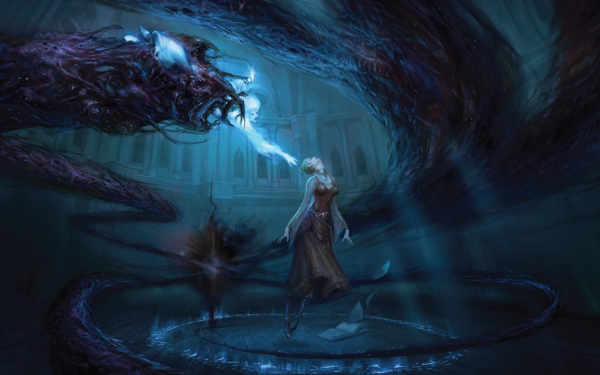 The sky of the Dark World is dominated by a huge moon shrouded in a haze of beige and blue clouds, which orbits the planet once every 16 days. During each new moon there is a chance of an eclipse, particularly during spring and fall, which tend to last for half an hour. During an eclipse the borders between the mortal world and the otherworld dissolves and spirits are freely roaming the lands. Anyone who is wandering around during an eclipse is at risk of finding themselves trapped in the otherworld when the sun returns so people lock themselves in when an eclipse approaches and don’t move from the spot until it ends. Travelers avoid making journeys shortly before the end of the month and the third day of the month tends to be a day of particularly high activity on the roads and in inns.
The sky of the Dark World is dominated by a huge moon shrouded in a haze of beige and blue clouds, which orbits the planet once every 16 days. During each new moon there is a chance of an eclipse, particularly during spring and fall, which tend to last for half an hour. During an eclipse the borders between the mortal world and the otherworld dissolves and spirits are freely roaming the lands. Anyone who is wandering around during an eclipse is at risk of finding themselves trapped in the otherworld when the sun returns so people lock themselves in when an eclipse approaches and don’t move from the spot until it ends. Travelers avoid making journeys shortly before the end of the month and the third day of the month tends to be a day of particularly high activity on the roads and in inns.
Magic is an art that comes naturally to spirits but can also be learned by mortals. However, delving into the occult knowledge and eldritch powers of the otherworld does profoundly change the mind and the very essence of a magician. As their power and knowledge increases, practitioners of magic become more and more like the fey. Ultimetely they can lose all of their humanity and becomes eldritch beings that wander off into the otherworld, rarely to be ever seen again. Many magicians believe that at lease some of the god-kings are former witches and sorcerers who somehow returned to the world of mortals to rule over their lesser subjects. To maintain a hold over their humanity and sanity, magicians have developed a number of traditions that incorporate philosophy, forms of meditation, the extracts of certain plants, and other means. (I’m thinking of running a Symbaroum campaign and this is an adaptation of the game’s mechanics.) The dominant traditions of theurgy, witchcraft, and sorcerey have developed in quite different ways, enabling their followers to focus on certain elements of magic with little risk of eldritch change, but still many find it tempting to delve into areas beyond those that are considered safe. Particularly among witches and sorcerers many are wondering if the changes are actually something to be avoided. Witches are often venerated for their closeness to the spirits and sorcerers frequently find the prospect of transcending their mortality highly attractive. Witches and priests more often find the discipline to practice restrained in their commitment to serving their people as spiritual leaders rather than abandining them for a quest into the unknown.
Monsters
The Dark World has no real distinction between civilization and nature and spirits are not seen as beings from another age or domain. People and spirits are both just as much part of the natural world as animals, though spirits are standing on the top. People living under the rule of a city are mostly left alone by spirits, but this doesn’t have anything to do with civilization having driven them out. Spirits in civilized lands stay out of sight because the power of the priest-kings and god-kings forces them to behave. They have to obey the overlord just as the people do. Those spirits that are not bound to any specific landmark usually tend to wander off and avoid the proximity to settlements. But people know very well 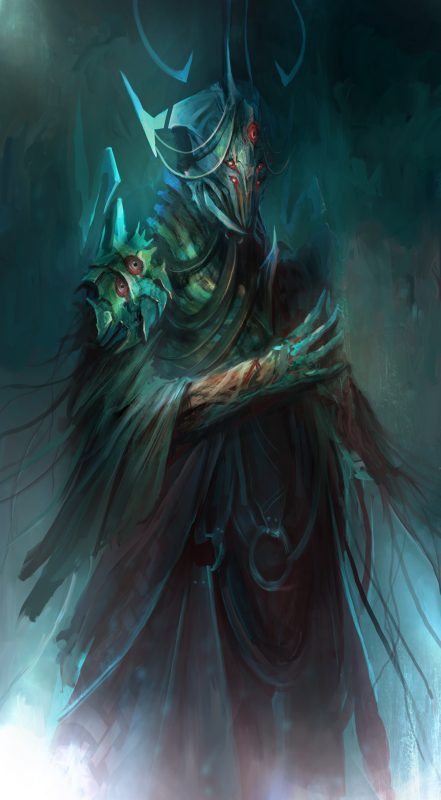 that spirits are roaming out there beyond the ends of the fields. Out in the woods encountering them face to face becomes significantly more likely. Some spirits are merely curious while others are outright hostile, but all of them can be extremely dangerous. Even though some of them can look suspiciously like mortals, they are drastically alien beings whose minds are much weirder than almost anyone can imagine. Predicting their behavior is always very risky and all of them have the power to inflict great harm, even if they don’t really intend to.
that spirits are roaming out there beyond the ends of the fields. Out in the woods encountering them face to face becomes significantly more likely. Some spirits are merely curious while others are outright hostile, but all of them can be extremely dangerous. Even though some of them can look suspiciously like mortals, they are drastically alien beings whose minds are much weirder than almost anyone can imagine. Predicting their behavior is always very risky and all of them have the power to inflict great harm, even if they don’t really intend to.
Like spirits, undead are also simply a part of the way the world is. While most religions have no concept of an afterlife, and the remaining ones never could really prove the existance of one, those who die don’t always stay truly dead. Ghouls, wights, shades, and wraiths rise under various circumstances, though I have not yet fully decided which ones these would be.
Other fictional creatures are normally nothing more than ordinary animals. The wildlife of the Dark World is in many ways very different to that of Earth, but they are natural beasts with the same limited abilities and mental capabilities as wolves or bears. The exception are spirits that come in the shape of animals, but these are fully supernatural creatures with no true overlap between the two.
